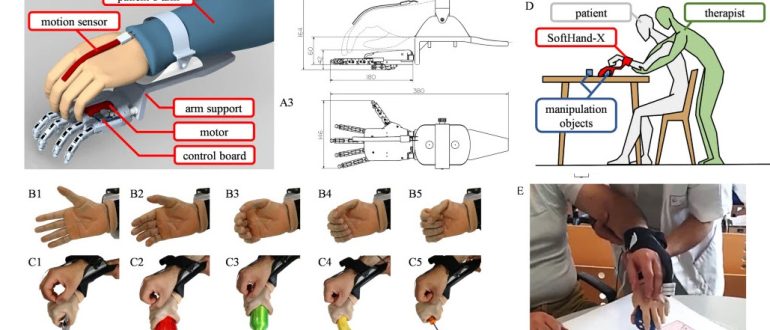Based on recent research, the SoftHand-X offers a promising new approach to task-specific practice for stroke patients, particularly for those with severe hand impairment. Recent studies highlight its potential to reduce spasticity, improve hand function, and enhance patient participation in rehabilitation.
The SoftHand-X is a supernumerary robotic limb, which is a wearable device that augments the human body with robotic fingers. The patient’s residual, minimal active finger or wrist extension movements are used to control the device’s finger extension, while relaxing their extensor muscles controls the robotic hand’s flexion.
A 2022 pilot study published in Nature utilised the SoftHand-X to administer task-specific training (TST) to sub-acute stroke patients who lacked sufficient active finger extension to perform these tasks unaided. Patients using it showed a decrease in spasticity, with the Modified Ashworth Scale (MAS) scores improving from a baseline of 1 (mild spasticity) to 0 (no spasticity) in most patients shortly after treatment. This reduction in spasticity was also supported by electromyographic (EMG) recordings, which showed a decreased stretch reflex in the wrist and/or finger flexors.
In a usability study, patients rated the SoftHand-X as ‘well-accepted’ and ‘good’ for its usability and showed excellent participation levels; demonstrating high motivation for the intensive, goal-directed motor tasks facilitated by the device.
Another study found the SoftHand-X could partially compensate for severely impaired hand function in chronic stroke patients and reduce spasticity.
Preliminary data suggests that using other control methods, like EMG measurements from extensor muscles, could expand the number of patients who can benefit from SoftHand-X-assisted therapy.
Future research will focus on expanding the sample sise and refining control mechanisms to make the SoftHand-X accessible to a wider range of patients. These soft robotic devices represent a paradigm shift towards personalised, accessible, and engaging neurorehabilitation, with the potential to improve recovery outcomes and quality of life for stroke survivors.
Ref for you: Trompetto, C., Catalano, M.G., Farina, A. et al. A soft supernumerary hand for rehabilitation in sub-acute stroke: a pilot study. Sci Rep 12, 21504 (2022).



